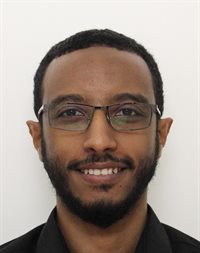What is your educational background?

My name is Mohammed Nimir; an honorary histopathology registrar and a PhD student at University of Birmingham, funded by the Cancer Research UK (CRUK) Clinical Academic Training Programme (CATP). I graduated from the University of Khartoum in Sudan, and went on to complete a MSc in Molecular Medicine in my Alma Mater, followed by a MSc in Cancer Sciences at the University of Glasgow. Thereafter, I started my postgraduate medical training during which I completed a PgCert in Medical Education at the University of Warwick.
Why did you want to study at the University of Birmingham?
The University of Birmingham is situated in the second largest city in the UK and is ranked as one of the top 100 universities in the world and the top 15 in the country. In addition, the university boasts 10 Nobel laureates among its alumni and staff, including Sir Paul Nurse (jointly awarded, for his work on the regulation of the cell cycle), a geneticist who headed CRUK in the past, was the former Chief Executive and Director of the Francis Crick Institute and President of the Royal Society. Furthermore, the university houses the institute of translational medicine (ITM) (where my project will be primarily based) which is a place where development and execution of patient-focused research is made frictionless via the institute’s partnership with world-leading hospitals and industry partners.
What attracted you to the CRUK PhD program?
On a professional and academic level, one would not go wrong with aiming to be affiliated with the largest volunteer-funded cancer research organisation in the world, which supports clinical PhD candidates with a generous fellowship package and a wealth of opportunities, including networking and personal and professional development. On a personal level, I have chosen to go for a post funded by CRUK as my aims and plans align perfectly with CRUK’s strategy in tackling cancer, particularly in relation to early detection and diagnosis of malignancies and in relation to development of stronger and more targeted therapies that are gentler on the patient and have less side-effects.
What is your research focused on?
We apply high-dimensional cytometry and high-dimensional spatial tissue analysis to paired blood and tumour samples from a melanoma patient cohort. The ultimate goal is to better predict immune checkpoint therapy response and toxicity. Spatial biology is a rapidly expanding area of research, and this project will increase research capacity in this space. The work benefits from Birmingham’s recent large-scale investment in cutting-edge spatial biology platforms (Lunaphore COMET and Nanostring GeoMX) and facilities. It addresses CRUK’s goal of addressing a relevant clinical question through the investigation of underpinning biological mechanisms.
How will a CRUK PhD help you with your career?
CRUK CATP is one of the best, if not the best, funding opportunities in the UK. In addition, CRUK provides annual training days for their trainees, spanning topics focused on developing transferrable skills including leadership, communication, public engagement training, and much more. Furthermore, CRUK fellowships come with a generous £1500 pot for personal and professional development, which can be used as the trainee deems necessary for their development towards becoming an independent researcher.
What advice would you give to someone applying for a PhD?
The most important thing is to start preparing early on, and I would advise aiming for 12-18 months in advance of when you intend to start your PhD training. Next, the applicant needs to make a decision regarding whether to join a PhD programme with an already developed research project, or apply for funding for their own project which was co-developed by the applicant and their supervisor (with the backing of a University or research institution). I opted to go for the former, as the project piqued my interest, and I was lucky to find immeasurable support from my, then-to-be, supervisors throughout the application process. Regardless of the type of project, the application process is highly competitive, so nothing short of giving it 100% will be enough to land a funded-PhD opportunity. I would highly advise considering the University of Birmingham, especially the CRUK CATP, as it is a world-renowned university which hosts innovative research projects using cutting edge technologies, in addition to providing invaluable support opportunities to us, their students.
What are you most proud of?
It is a privilege to be able to serve patients a doctor, but I always felt that I needed to do more, especially for cancer patients. This came from personally witnessing how devastating cancer can be for individuals, their families, and their community. Hence, I decided to tackle this entity which led me to completing postgraduate degrees culminating in my current appointment as a PhD student. My hope is that my research helps patients and pushes the boundaries of medical knowledge. Therefore, I am proud, and thankful for the grace of Allah, for being able to say that I am affiliated to the University of Birmingham and the CRUK, and I look forward to adding a PhD from this prestigious institution, God-willing, to my arsenal of skills and my CV.